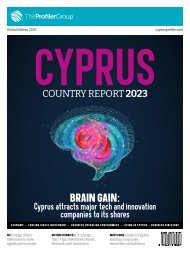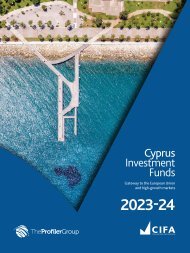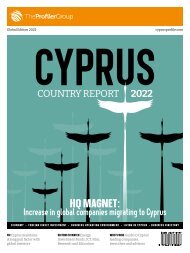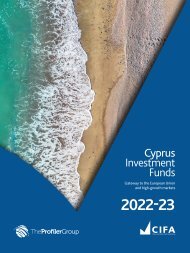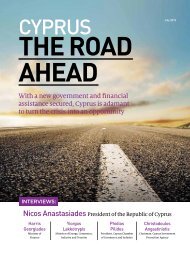2020 Cyprus Country Report
The 2020 Cyprus Country Report features in-depth articles on the economy, foreign direct investment, international trade and headquartering as well as detailed sector profiles and insights from Cyprus’ 100 most influential political, economic and business leaders shaping the future of their country and its industries.
The 2020 Cyprus Country Report features in-depth articles on the economy, foreign direct investment, international trade and headquartering as well as detailed sector profiles and insights from Cyprus’ 100 most influential political, economic and business leaders shaping the future of their country and its industries.
Create successful ePaper yourself
Turn your PDF publications into a flip-book with our unique Google optimized e-Paper software.
Travel & Living<br />
PUBLIC TRANSPORT<br />
Within urban areas, buses run on fixed routes roughly every half<br />
hour, with services ending in the evenings at about 18:00 Monday<br />
to Friday and earlier on Saturdays. Some routes have no service<br />
on Sundays. Hours are extended until midnight during the tourist<br />
season and some urban routes now offer a night bus service on<br />
Fridays and Saturdays. Timetables are available from tourist offices<br />
or directly from the bus companies. Rural buses connect towns<br />
and villages and make frequent stops. The service is infrequent<br />
with schedules limited to one or two routes per day. These buses<br />
can often be smaller mini-buses. There are also buses providing a<br />
service linking all major towns. These are generally very regular<br />
and all buses are modern and comply with European standards. A<br />
private company, Kapnos, provides a regular daily airport shuttle<br />
service between the major towns and cities and both of the island’s<br />
airports. There are no trains in <strong>Cyprus</strong>.<br />
www.cyprusbybus.com<br />
www.intercity-buses.com<br />
www.kapnosairportshuttle.com<br />
CAR HIRE & TAXIS<br />
Car and motorcycle rental firms have offices in all towns, as well<br />
as at Larnaca and Paphos International Airports. Their rates vary<br />
according to the rental period, season of the year and extras. They<br />
usually offer unlimited mileage and their cars can be delivered and<br />
collected at the airports by prior arrangement. Rental cars and bikes<br />
are usually delivered to the customer with a full tank of fuel paid for<br />
by the customer. When the car is returned, the customer receives a<br />
refund for any remaining fuel, unless stated otherwise in the contract.<br />
Drivers under 25 years of age holding a driving license for less<br />
than three years must inform the car rental company so special insurance<br />
cover can be provided. Foreign visitors are strongly advised<br />
to read the rental agreement carefully and demand fulfilment of<br />
all their rights. Taxis are also very common, but before setting off<br />
on your journey discuss the pricing with the driver and ensure the<br />
meter is functioning. TravelExpress is another good option, as a<br />
private company, which provides a shared taxi service between<br />
cities in <strong>Cyprus</strong>. Taxi service app Bolt (formerly Taxify), which was<br />
created in Estonia, has also successfully launched in <strong>Cyprus</strong> operating<br />
in Nicosia and Limassol. The app allows users to set their<br />
location and see where the nearest partner taxi is and order it. The<br />
taxi can be tracked heading to the customer’s location and indicates<br />
how far away it is and how long it will take to arrive. Customers can<br />
also track their routes while inside the cab, preventing drivers from<br />
taking longer routes and overcharging for trips. Customers can also<br />
pay via their phones.<br />
www.travelexpress.com.cy<br />
www.bolt.eu<br />
DRIVING<br />
Roads are well maintained in and between the main towns, and<br />
there are four-lane motorways connecting Nicosia with Limassol<br />
and Larnaca. Driving is on the left in <strong>Cyprus</strong> and the maximum<br />
speed limit on motorways is 100 kph (60 mph). <strong>Cyprus</strong> accepts the<br />
driving licences of all EU Member States and any person with a valid<br />
licence may drive legally in <strong>Cyprus</strong>. According to EU rulings, driving<br />
licences issued before 1996 do not have to be exchanged for the new<br />
Community Model and remain valid until their expiration. Non-EU<br />
citizens may drive on valid foreign licences for a certain period (for<br />
those with a US licence the period is six months). Relevant Consular<br />
authorities can provide further information.<br />
Important Numbers<br />
<strong>Cyprus</strong> Dialling Code: +357<br />
Emergency (medical, fire, police): 112<br />
Emergency Air and Sea Rescue: 1441<br />
Hospital information: 1400<br />
Directory Enquiries: 11892<br />
162 <strong>Country</strong> <strong>Report</strong> CYPRUS <strong>2020</strong>



